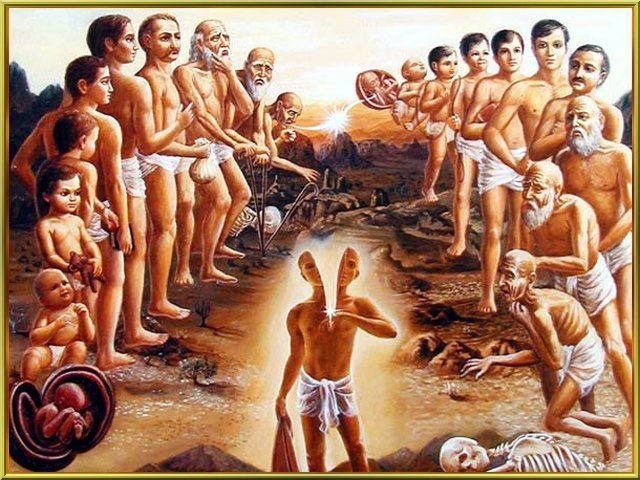Verse 31
svadharmam api cāvekṣya na vikampitum arhasi
dharmyād hi yuddhāc chreyo ’nyat kṣatriyasya na vidyate
Word-by-Word Meaning:
| Sanskrit | Meaning |
|---|---|
| svadharmam | one’s own duty (according to one’s nature or varna) |
| api | even |
| ca | and |
| avekṣya | considering / taking into account |
| na | not |
| vikampitum | to waver / be disturbed |
| arhasi | you ought / you deserve |
| dharmyāt | in accordance with dharma / righteousness |
| hi | surely / indeed |
| yuddhāt | than battle / war |
| śreyaḥ | better / superior |
| anyat | other / else |
| kṣatriyasya | for a Kshatriya (warrior) |
| na vidyate | does not exist / there is none |
Even considering your own duty (svadharma), you should not waver. For a Kṣatriya, there is nothing better than a righteous war (dharma-yuddha).

Expanded Commentary:
In this verse, Krishna shifts from philosophical truths about the soul to the practical application of dharma in Arjuna’s life. Having taught the immortality of the Self, Krishna now appeals to Arjuna’s duty as a warrior. This transition marks the movement from Jnana (knowledge) to Karma (action).
Krishna’s Key Message:
- You are a Kṣatriya—a warrior by birth and nature.
- Your svadharma (personal duty) is to fight for justice and protect righteousness.
- To avoid battle out of fear or attachment is a dereliction of duty.
- A righteous war, fought with noble purpose and ethical intent, is not sin but a sacred responsibility.
Symbolic Meaning:
| Term | Symbolizes |
|---|---|
| Svadharma | One’s unique duty in life based on their inner nature (svabhāva) |
| Vikampitum | Inner hesitation or emotional confusion |
| Dharma-yuddha | A war fought to uphold truth, justice, and cosmic order |
| Kṣatriya | The archetype of responsibility, bravery, and protection |
| Śreyas | Supreme good, long-term spiritual benefit |
Philosophical Insights:
- Dharma over Emotion:
- Even if one feels confused or disheartened, righteous action must prevail.
- Krishna teaches that personal emotion must yield to divine responsibility.
- Right Action as Worship:
- Performing one’s svadharma is not just social duty—it’s a spiritual path.
- For Arjuna, this war is not for gain but for the restoration of dharma.
- Contextual Ethics:
- Dharma is not the same for everyone. What is right for a monk may not be right for a king.
- Arjuna’s path is that of a warrior, and retreat here would be adharma (unrighteousness).
- No Greater Duty for a Kṣatriya:
- Krishna says there is no greater good than standing for righteousness through rightful battle.
- Running from duty out of attachment or fear leads to spiritual downfall.
Practical Application:
- Clarify Your Svadharma: Understand your true nature and calling—your life’s duty. When you act in alignment with it, your life becomes purposeful.
- Face Challenges with Courage: When difficulties arise, don’t run. Stand firm in what is right, even when it’s hard.
- Don’t Let Emotions Cloud Duty: Like Arjuna, we often feel overwhelmed. But clarity comes when we prioritize truth over fear.
- Dharma Is Personal: Everyone has a unique spiritual role. Embrace yours with full commitment.
Reflection Questions:
What is my svadharma—my unique path and purpose in this life?
Am I avoiding responsibilities due to fear, confusion, or emotional entanglement?
How can I align my daily actions with what is right, not just what is easy?
What does a righteous struggle look like in my own life today?
Conclusion:
Lord Krishna gently reminds Arjuna that knowing the truth is not enough—acting upon it is essential. Arjuna’s hesitation is natural, but it must give way to courage born of clarity. Fulfilling one’s svadharma is the highest offering to life and to God.
Krishna’s message resonates with all seekers: Live your truth. Uphold your dharma. Do not let fear, attachment, or sorrow block the path of righteousness. In this lies real fulfillment and inner peace.
